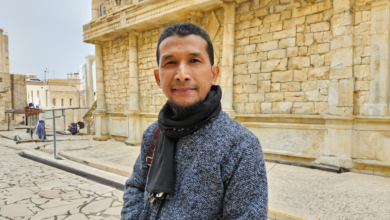How to Read and Location of Nun Wiqoyah in the Qur'an

How to Read and Location of Nun Wiqoyah in the Qur'an
Assalamualaikum. Ustadz, I want to ask a question.
Nun Wiqoyah is in what chapter and in what verse from chapter 1 to chapter 30?
Thank you, Chaplain.
Greetings, Fulanah
ANSWER:
Wassalamu'alaikum warahmatullahi wabarokaatuh.
Bismillah… Nun Wiqayah literally means protection. It is so named because it exists to protect the meeting of two words, where the first word has the end of tanwin and the second word begins with hamzah washal (continued).
Harakat tanwin is actually like turning off the vowels with nun. Meanwhile, if the hamzah washal is connected, it will not be read, aka dead. Nun Wiqayah in tajwid is Nun who comes from tanwin when tanwin meets hamzah wasal. Besides being called Nun Wiqayah, the nun is also called Nun Shilah (continued), Nun Washal (continued), Nun Iwadh (changed), and Nun Tanwin.
Nun Wiqayah only appears when we want to read washal (connected) and there is a meeting between tanwin and hamzah wasal. Nun Wiqayah was given the harakat kasrah in exchange for tanwin which turned into an ordinary harakat.
The way to read it is to read tanwin on letters that are tanwin either fathatain, kasratain, or dlommatain replaced with fathah, kasrah, or dlommah only, then add the reading of nun kasrah after it (precisely under hamzah washal) while continuing with the word after it.
Example:
الْمَسَاقُ (Yaumaidzin almasaaq), read as Yaumaidzinil masaaq.
Usually, for Indonesian-made manuscripts, the letters Nun Wiqoyah or small nun are written to make it easier for the reader. However, for Middle Eastern manuscripts that do not include lowercase nun letters, only add a small shod (ص) above the hamzah washal or the beginning of the second word.
There are so many examples of reading Nun Wiqayah in the Qur'an, so we will not include all of them. However, here are 25 examples of reading Nun Wiqayah in the Qur'an:
- Surah Al-Ikhlas verse 1-2 (ahadunillaahu): اللَّهُ
- Surah Al-Humazah verses 1-2 (lumazatinilladzii): لُّمَزَةٍ الَّذِي
- QS Al-Alaq verses 2-3 ('alaqiniqro'): لَقٍ اقْرَأْ
- QS Al-Qiyamah verse 30 (yaumaidzinilmasaaq): الْمَسَاقُ
- QS Al-Qiyamah verse 12 (yaumaidzinilmustaqarr): الْمُسْتَقَرُّ
- QS Al-Muzzammil verses 17-18 (Syiibanissama'): ا السَّمَاءُ
- QS Al-Mulk verses 1-2 (Qadiirunilladzii): الَّذِي
- QS As-Syu'ara verse 123 ('Adunilmursaliin): ادٌ الْمُرْسَلِينَ
- QS As-Syu'ara verse 160 (Luuthinilmursaliin): لُوطٍ الْمُرْسَلِينَ
- QS As-Syu'ara verse 105 (Nuuhinilmursaliin): الْمُرْسَلِينَ
- QS Al-Hadid verse 27 (warahbaaniyyatanibtada'uuhaa): انِيَّةً ابْتَدَعُوهَا
- QS Al-Hadid verses 23-23 (fakhuurinilladziina): الَّذِينَ
- QS An-Najm verse 50 ('Aadanil uula): ادًا الْأُولَىٰ
- QS Al-Hajj verse 11 (Khoirunithma anna): اطْمَأَنَّ
- QS Al-Hajj verse 11 (Fitnatuninqalaba): انقَلَبَ
- QS Al-Hajj verse 25 (sawaa'anil'aakifu): اءً الْعَاكِفُ
- QS Ibrahim verse 18 (Karomaadinisytaddat): ادٍ اشْتَدَّتْ
- QS Ibrahim verse 26 (Khabiitsatinijtutstsat): اجْتُثَّتْ
- QS Maryam verse 7 (bighulaaminismuhuu): لَامٍ اسْمُهُ
- Surah Maryam verse 61 ('adninillatii): الَّتِي
- QS Al-Kahf verse 77 (Qoryatinistath'amaa): اسْتَطْعَمَا
- QS Al-Kahf verse 88 (Jazaa'anilhusnaa): اءً الْحُسْنَىٰ
- QS At-Taubah verse 30 (Uzairunibnu): ابْنُ
- QS At-Taubah verse 24 (Wa amwaluniqtaraftumuuhaa): الٌ اقْتَرَفْتُمُوهَا
- QS At-Taubah verses 79-80 (aliimunistaghfir): لِيمٌ اسْتَغْفِرْ
Wallâhu a'lam bish-showâb.
Regards!
(Answered by: Ustadz Very Setiyawan, Lc., S.Pd.I., MH)
#SahabatMigran want to consult about Islamic religious issues and life issues? Come on, submit the question via a WhatsApp message to the number +852 52982419. [DDHKNews]



